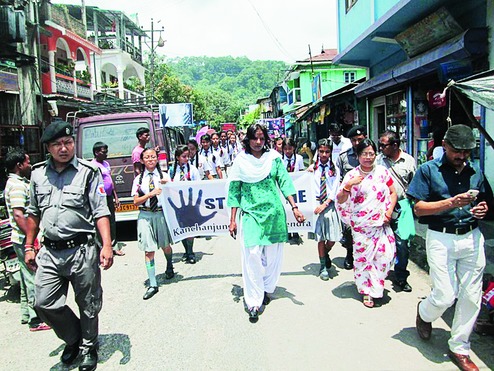
.jpg)
Getting through to Rangu Souriya's phone isn't difficult; the challenge lies in catching her at a time when she can talk. The activist, who runs a non-profit organisation that rescues trafficked women, is based in Panighata village in Mirik subdivision of Darjeeling. Every time we call she is on the road. " Kaaje raastay aachhi... I am out on work," she tells The Telegraph.
It is only later, when she is finally done with it, that she tells us that she and others from her NGO, Kanchanjunga Uddhar Kendra, or KUK, have been out distributing ration in certain areas of Darjeeling's Kurseong subdivision; the lyrically named remote villages of Saath Ghumti, Durpin Dara, Thapathali... The Darjeeling lockdown called by the Gorkha Janmukti Morcha, demanding a separate state, is about to enter its third month. Clearly, things are getting difficult.
KUK was set up in 2004. Since then, she has rescued over 850 women, most of them trafficked from North Bengal, Sikkim, Assam and Nepal. She refuses to comment on the Gorkhaland issue, "I am a social activist. I have a conscience that will not let me rest in peace when I see people suffer or dying from hunger."
Rangu was born to parents who were tea garden workers in Panighata. She does not just understand the problems of the people, she has also lived them - the difficult lives led by the women employed in the tea estates, the juggling work and home, the abusive husbands. Before you think otherwise, she tells you that her mother did not have to face any of this. On the contrary, many a woman came to her seeking shelter. "I didn't realise then but you could say my mother was a social worker in her own way," she says with obvious pride.
The tea gardens, whatever their intrinsic problems, were a source of income. More and more of them are being shut down, burdening the hills with poverty and joblessness, making it easier to lure women of the area with promises of better lives.
According to Government of India data, 19,223 women and children were trafficked in 2016, almost a 25 per cent increase over 2015. Most of the cases were from Bengal. "Not just the hills," points out Rangu, "I have seen girls from Purulia, South Dinajpur, Calcutta, North and South 24-Parganas and Malda also, in the brothels of Pune and Mumbai. Obviously, there is some crisis in the state."
Rangu takes up cases only when parents or guardians of missing women approach her. That apart, some "clients" who frequent red-light areas also inform KUK about girls who want and need help.
Gallant as it sounds, rescue work is tricky business. It requires one to inhabit places and negotiate situations one would be loath to imagine. Rangu tells you how she gets in and out of brothels. "When I was younger I looked like a man. I'd mostly be in trousers and my hair was short. Once, during a brothel raid, I was wearing a jacket and a cap too. They [brothel owners] assumed I was a client."
In Rangu's experience, the rescue act is replete with operational and psychological hurdles. Often, despite a foolproof plan, raids come to a nought. "The nexus between traffickers is stronger than the NGO-police connect," she says, before proceeding to rattle off specifics of a 2016 case. Tipped-off about a woman and her baby held captive in Khalpara, KUK members and the police reached the red-light area in Siliguri. They had the room number too. Nevertheless, the mother and child were nowhere to be found.
Rangu says, many a time the trafficked accept their lot and "settle down" to their new life. It is the "new imports" who want to be rescued.
That day in Khalpara, she noticed a woman watching her. A kind word or two and she was telling her story. She was 25 and a mother of four, brought from Bhakta Duba in Assam a fortnight ago. She wanted to get out. Heated arguments and resistance followed, and a mobbing... Additional police force had to be called in for Rangu to take her new ward out.
Another time, she got roughed up by a trafficker. After a hide-and-seek that lasted many months, she spotted him in Bagdogra. She alerted the police and started tailing him. The plan was to engage with him and stall him till police arrived. Sensing trouble, he hit Rangu on her chest and escaped. She blacked out and had to be hospitalised.
Rangu says her actual task begins after the rescue. FIRs and cases have to be filed and pursued; the rescued have to be guided through court hearings. And then there is rehabilitation.
Sometimes the rescued are rejected by their families. Then, Rangu has to request locals to take them in - not an ideal scenario as she has come to understand. But there is not a single government home or NGO-run shelter in all of Darjeeling district. In 2009, KUK acquired some land to construct one such home but it continues to be a work in progress.
In the last 13 years, Rangu has got three traffickers and a brothel manager convicted, many more are under the police radar. She has been felicitated from several quarters for her untiring efforts - the last being a presidential honour in 2016. But life-threats are more frequent.
When she is not walking the talk, she actually talks it - holds awareness programmes on trafficking, child abuse and domestic violence.
It is quite literally an up-hill task, but then a crusader knows no limits.











